OpenAI launched ChatGPT in February 2023, and it quickly became a go-to tool for all kinds of tasks. Need a recipe, help with coding, or an SEO article written? ChatGPT has got you covered, thanks to its vast knowledge of just about everything. This got people wondering: could we also use ChatGPT as a therapist or coach?
Table of Contents:
I. People Are Using ChatGPT (chatbot) as a Therapist–a Small Internet Trend in 2023
II. 2. The Logic of ChatGPT vs. the Logic of Therapy
IV. In Which Areas Could ChatGPT Outperform Human Therapists?
V. Do Not Use ChatGPT as a Therapist
VI. Beware of AI Therapy Apps Developed After 2023
VII. Mindset AI, a Private, Proactive, and Intentional therapy & coaching assistant
VIII. Conclusion
I. People Are Using ChatGPT (chatbot) as a Therapist–a Small Internet Trend in 2023
In 2023, using ChatGPT as a therapist sparked interest online. A search on Google or a glance through Twitter reveals many comments suggesting that ChatGPT, along with other AI chatbots, could rival human therapists. This trend prompts an important question: Is AI becoming a preferred option for emotional support and psychological advice? It appears that an increasing number of people are exploring AI as a trustworthy source for guidance and personal growth.


II. The Logic of ChatGPT vs. the Logic of Therapy
ChatGPT (and other chatbot) is a passive correlation finder that needs expert input
ChatGPT is a substantial language model (basically an advanced smart library index system), built with an extensive database of information. The model's output is significantly shaped by the input it receives from users. To obtain precise and relevant results, it's crucial to be proficient in how you formulate your queries. It also means it depends on how well do you already understand therapy practice and your own awareness. Additionally, ChatGPT functions passively, relying on user prompts without taking an active role in directing the conversation. This characteristic underscores the importance of expert input for effective therapy.
Therapists proactively guide you through a discovery process
Unlike a language model like ChatGPT, a therapist takes an active role in the therapy process. They employ probing questions and share insights and perspectives that aid individuals in achieving a deeper comprehension of their own selves and experiences. The goal of therapy is to unearth root causes, identify patterns and triggers, and foster personal growth and healing. Therapy transcends merely offering correlated responses; it seeks to tackle the underlying issues head-on and encourages enduring transformation.
Therapists follow a strict ethical code that is naturally not met with ChatGPT
Therapists are bound by a strict ethical code that governs their interactions with clients, ensuring professionalism, confidentiality, and the overall well-being of those they treat. However, ChatGPT, being an AI language model, does not adhere to the same ethical standards. While it can provide helpful information and simulate a conversation, it lacks the understanding and empathy that a human therapist possesses. In addition, ChatGPT cannot maintain client confidentiality or provide a safe and secure environment for therapy as your data can be used in training the model. The personal information you disclose with ChatGPT using your account may become a privacy concern.
III. Who Can Benefit From Using ChatGPT (Chatbots) as a Therapist According to Mental Health Experts?

If you are well aware and can provide an accurate diagnosis of yourself to ChatGPT
Remember, ChatGPT does not know anything about you. For you to effectively leverage ChatGPT therapy, you must be familiar with the therapeutic process and ethics and understand what to expect from therapy. You already know what exactly you need from a therapist. You can give personal information and exact prompts for ChatGPT to ask you questions or remind you what you already know. Since the expectation is clear, you will not be disappointed. But ChatGPT will most likely not be able to bring you to a place that you have not been in your therapy session before.
If you use ChatGPT for CBT homework
CBT (cognitive behavior therapy) can be effective when clients do regular homework in between therapy sessions. CBT often involves the client completing “homework” assignments between therapy sessions. These assignments are designed to help the client practice and apply the skills and strategies learned in therapy to real-life situations. By doing regular homework, clients can reinforce the new patterns of thinking and behavior they are learning in therapy.
Regular homework can also help clients to make progress more quickly, as it allows them to practice and apply what they are learning in therapy to their everyday lives. This can lead to tangible changes in behavior and thinking patterns. Therefore, if a client is familiar with the CBT framework, using ChatGPT to help with the process can be beneficial.
If you need quick, general advice that is not personalized
ChatGPT has limited memory (token limit in each chat), and even if you set ChatGPT as a therapist in the beginning and start to tell ChatGPT of your problems, ChatGPT can only give a response using the information within the token limit. So it will forget what you have discussed and what role it is adopting. It's important to remember that ChatGPT may not have the capacity to remember detailed personal information or maintain a specific role throughout a lengthy conversation. If you need personalized advice, it's best to seek help from a human counselor or trusted professional.
IV. In Which Areas Could ChatGPT Outperform Human Therapists?
Instant support and accessibility for doing therapy homework
Unlike human therapists, who have set working hours and may not be accessible between sessions, ChatGPT is available 24/7. This makes it an invaluable resource for individuals who are engaged in therapy and need assistance or encouragement with their therapy homework outside of scheduled sessions. ChatGPT can offer prompts, reminders, and support for exercises or reflective practices assigned by a therapist, ensuring continuity in the therapeutic process. Its instant accessibility means that users can maintain momentum in their personal growth and healing journey, even when direct contact with their therapist is not possible. This level of support and accessibility is particularly beneficial for reinforcing the lessons and strategies learned in therapy, helping to integrate them more fully into daily life.
Non-judgmental interaction
One of the unique benefits of ChatGPT is its capacity to provide a completely non-judgmental space for users to express their thoughts and feelings. Unlike human interactions, which can sometimes be influenced by personal biases or judgments, ChatGPT responds based on algorithms that are devoid of personal opinions or emotions. This can create a safe and welcoming environment for individuals to explore sensitive topics or disclose personal struggles without fear of criticism or misunderstanding. The non-judgmental interaction offered by ChatGPT can encourage users to be more open and honest, potentially leading to greater self-awareness and insight. This aspect of ChatGPT could be particularly advantageous for individuals who are hesitant to seek therapy due to concerns about stigma or judgment, thereby making it an effective tool for initial steps into mental health exploration.
Knowledge of different therapeutic processes
If you are interested in trying different therapies and seeing what works best for you, it can be helpful to know different therapeutic processes. With an understanding of various therapeutic approaches, you can better navigate the options available to you and make informed decisions about the type of therapy that may be most beneficial for your needs. By familiarizing yourself with techniques such as cognitive behavioral therapy, dialectical behavior therapy, psychodynamic therapy, and mindfulness-based therapies, you can gain insight into the unique benefits and methods of each approach. With this knowledge and awareness of different therapeutic processes, you could instruct ChatGPT to try these tools with you, allowing you to explore different strategies and methods to determine which resonates most with you. This can empower you to take a more active role in your therapeutic journey and facilitate a more personalized and effective treatment experience.
Most likely you will not develop transference or over-dependence with ChatGPT
What is transference & counter transference in therapy?
Transference in therapy is when a patient unconsciously redirects feelings, attitudes, and desires from past relationships onto the therapist. This can be positive or negative and often reflects the patient's past experiences with authority figures or significant others. It can also involve strong emotions like love, anger, or dependency.
On the other hand, countertransference occurs when the therapist unconsciously projects their unresolved issues or emotions onto the patient. This can be detrimental to the therapeutic relationship and may hinder the therapist's ability to effectively help the patient. Therapists need to be aware of and address any countertransference issues that arise during therapy.
Both transference and countertransference can have a significant impact on the therapeutic process, and therapists need to navigate these dynamics with sensitivity and awareness. By recognizing and addressing transference and countertransference, therapists and patients can work together to gain insight into the patient's underlying issues and create a more effective and supportive therapeutic environment. Ultimately, understanding and managing transference and countertransference is crucial for successful therapeutic outcomes.
Why can transference & counter transference be dangerous?
Transference and countertransference can be dangerous in a therapeutic setting because they can cloud the judgment and objectivity of the therapist. This can lead to a blurred boundary between the personal and professional relationship, potentially leading to unethical or harmful behavior. For example, a therapist may start to feel responsible for the client's well-being, leading to boundary violations or over-involvement in the client's life. Additionally, unresolved transference and countertransference can hinder the progress of therapy, as it may distract from the actual issues at hand. Therapists must be aware of these dynamics and seek supervision or consultation to ensure that they are not being negatively influenced by transference and countertransference.


Low Risk for Transference & Counter Transference with ChatGPT
When it comes to ChatGPT, it is unlikely that users will develop transference or over-dependence. This is because ChatGPT is an artificial intelligence program designed to process and generate text based on input, rather than forming a personal relationship with its users.
Unlike human therapists, ChatGPT does not have emotions, experiences, or the ability to form a personal connection with users in the same way a human therapist can.
As a result, it is difficult for users to project their emotions and expectations onto ChatGPT in the same way they would with a human therapist.
Additionally, ChatGPT cannot provide the same level of personalized care and support that a human therapist can offer, further reducing the likelihood of developing transference or over-dependence. While ChatGPT can still provide valuable support and guidance, users need to recognize its limitations and seek out human interaction when necessary.
Overall, the nature of ChatGPT as an artificial intelligence program makes it unlikely for users to develop transference or over-dependence, as it lacks the personal qualities and emotional capacity that can lead to these dynamics in traditional therapy settings.
V. Do Not Use ChatGPT as a Therapist
We do not recommend using ChatGPT as your therapist, especially under the following circumstances.
You have no or limited experience with human therapist
Human therapists bring years of study and hands-on experience to their practice, understanding the complexities of human psychology in a way that an AI currently cannot. Without previous therapy experience, it may be challenging for you to discern the nuanced guidance a professional can offer compared to the more generic responses from ChatGPT. It's crucial to seek out professional advice for mental health issues, especially if you're just starting your therapeutic journey.
You want to discover blind spots, root causes
Identifying blind spots and understanding the root causes of one's behaviors and emotions often require the expertise of a trained human therapist. They can pick up on subtle cues and patterns that an AI, which lacks human insight, might miss. For in-depth personal discovery and addressing core issues, the guidance of a professional therapist is invaluable.
You want a human therapist to hold you accountable for change
A human therapist actively helps set goals, tracks progress, and gently but firmly holds you accountable, facilitating real transformation. This personal touch and commitment are beyond the scope of AI-driven therapy, where the lack of human engagement might lead to a less disciplined approach to personal growth.
Your don't want your personal data to be used for AI training
For those who are uncomfortable with the possibility of their data being utilized to further train AI models, this could be a concern. While OpenAI ensures privacy and data protection, the inherent nature of AI learning may not align with the privacy preferences of all users. If retaining control over personal data is a priority, a human therapist, bound by confidentiality agreements, may be the preferable option.
VI. Beware of AI Therapy Apps Developed After 2023
Many new AI therapy apps are just a ChatGPT wrapper.
Many new AI therapy apps launched after 2023 might not offer original or proprietary AI solutions. Instead, they often use ChatGPT as their underlying technology, essentially repackaging it with perhaps a few tweaks here and there. This means while they may promise innovative approaches to mental health support, they might not significantly differ in capability or offer advancements beyond what ChatGPT already provides. Users looking for AI therapy solutions should consider this to make informed choices about the tools they decide to use for their mental health needs.
Your privacy might be compromised
When using AI therapy apps developed after 2023, there's a potential risk to your privacy. These apps might collect and use your conversation data for AI training or other purposes, which could lead to concerns about how personal information is handled. It's vital to review their privacy policies and understand the measures they take to protect user data.
VII. Mindset AI, a Private, Proactive, and Intentional therapy & coaching assistant
We developed Mindset AI, a 100% private, proactive therapy & coaching assistant for relationship wellness and personal growth. Designed to enhance therapy and coaching for relationship wellness and personal growth. It combines privacy and proactivity to create a personalized support system that helps users navigate their emotional landscape and achieve their personal goals. Through its advanced AI, Mindset AI aims to complement traditional therapy by providing accessible, immediate support and encouraging real-life interactions and professional consultations for a holistic approach to mental wellness.
Mindset AI builds your psychological profile by asking the right questions
Mindset AI distinguishes itself by proactively building a comprehensive psychological profile for each user. By asking targeted and insightful questions, it not only grasps the user's current mental state but also uncovers deeper psychological patterns and needs. This intelligent querying allows Mindset AI to tailor its guidance and support, making each interaction more meaningful and effective in fostering personal growth and healing.
Mindset AI is beyond CBT–it uses humanistic therapy, DBT, somatic therapy, family dynamics & inner child tools
Mindset AI takes a comprehensive approach to mental wellness, extending beyond CBT to encompass a variety of therapeutic techniques. It integrates principles from humanistic therapy, DBT (dialectical behavior therapy), and somatic therapy, and utilizes tools focused on family dynamics and inner child work. This multifaceted approach ensures that Mindset AI can offer personalized and deeply effective support, catering to the unique needs and experiences of each user.
Mindset AI is more of a coach to help you succeed in different life areas & relationship health
Mindset AI goes beyond traditional therapy models to act as a coaching assistant, designed to foster success in various life areas including relationship health. It offers guidance and support tailored to help users achieve their personal and professional goals, enhancing overall well-being and interpersonal connections. 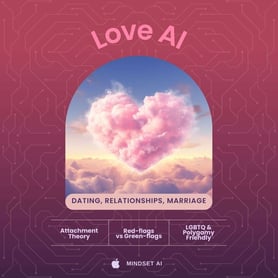
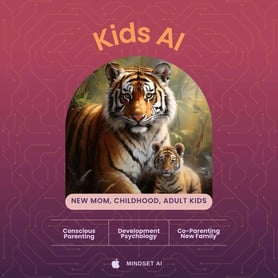
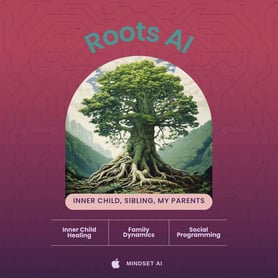
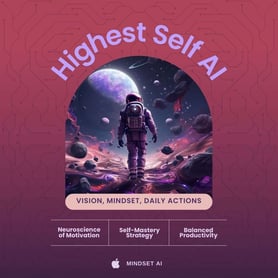
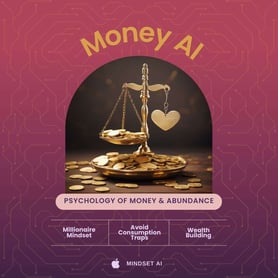
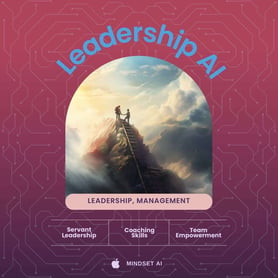
Mindset AI provides evidence-based tools for emotional regulation and wellness
Mindset AI is equipped with evidence-based tools aimed at enhancing emotional regulation and overall wellness. These tools are grounded in scientific research, ensuring that users have access to strategies that are proven to be effective in managing emotions and fostering mental health.
Mindset AI remembers you and proactively interacts with you.
Mindset AI sets itself apart by remembering each interaction, creating a continuous and evolving understanding of you. It proactively engages, offering timely and relevant support that's aligned with your ongoing personal journey. This feature makes it not just a tool, but a companion in your path towards self-improvement and well-being.
You are 100% anonymous with Mindset AI
With Mindset AI, your privacy is a top priority. The app is designed to ensure that all your interactions are kept confidential, providing a secure space for personal growth without concerns about data misuse. This commitment to privacy allows users to engage openly, knowing their information is protected.
Mindset AI also takes your anonymity seriously, ensuring you can use its services without linking to Google accounts or other personal identifiers. This layer of anonymity means you're not just protected; you're virtually invisible, allowing for a focus purely on self-improvement without any digital footprint of your journey.
Mindset AI encourages you to have real-life interactions including speaking to human professionals.
Mindset AI not only offers digital support but also encourages engaging in real-life interactions, including consulting with human professionals. This approach fosters a balanced path to well-being, integrating the convenience of AI with the irreplaceable value of human connection and expertise.
Conclusion
In conclusion, while ChatGPT offers intriguing possibilities, it's not designed to serve as a therapist. Mindset AI, with its enhanced capabilities, stands out as a more equipped option for those seeking AI-assisted mental health support. However, it's important to remember that neither ChatGPT nor Mindset AI is intended to replace the invaluable insights and personalized care that come from sessions with human professionals.




